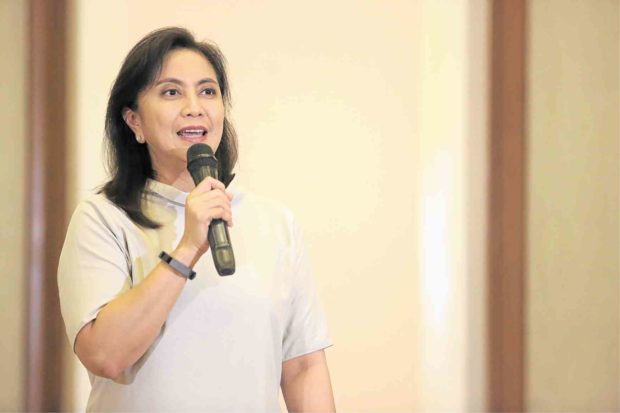Vice President Leni Robredo on Sunday criticized the administration’s anti-“tambay” campaign for being “antipoor,” adding that the President’s flip-flopping statements were adding to the confusion.
“It’s like the law enforcement officials have been given the license to abuse,” Robredo said in her Sunday radio show, BISErbisyong LENI, on dzXL.
“We have already seen the danger [posed by unchecked law enforcement operations] at the height of the antidrug war. We are repeating that again,” she added.
On June 13, the President warned tambays or loiterers to stay home or he would have them thrown into Pasig River.
Original directive
“My directive is, if you’re just standing by [in the streets], tell them, ‘Go home. If you don’t go home, I’ll bring you to the office in Pasig,” he said. “I’ll take care of it. Tie their hands together and I’ll throw them in [the river].”
The police took his words as a directive to arrest loiterers, with nearly 7,300 people rounded up since June 13.
Last Friday, however, the President appeared to double down on his order, telling an audience in Davao City he never directed the police to catch tambays.
“I never said, ‘arrested.’ But if you are drinking in the alley, in the squatters’ area and making a living room out of the road there, you’ll really get nabbed,” he said.
“Maybe it became controversial because no less than the President said it — that loiterers should be arrested,” Philippine National Police Director General Oscar Albayalde commented when sought for a reaction.
But Albayalde said the crackdown would continue, particularly against those caught violating local ordinances such as smoking or going around shirtless in public.
Drive hit by controversy
The “anti-tambay” campaign became controversial after Genesis Argoncillo, who was arrested on June 15 while buying cell phone load from a store, died while in detention.
As the Quezon City police issued conflicting statements on his cause of death, the Crime Laboratory autopsy showed he died due to blunt force trauma and his manner of death was homicide.
Robredo, a former public lawyer, said community leaders and lawyers should help ensure that human rights — especially those of the poor — were respected.
“We are calling on [everyone] to know what to do if there’s a danger that we will become victims,” she said. “We are asking [the lawyers] to group together and help each other combat these [dangers].”
Her political party echoed her sentiments. According to Erin Tañada, Liberal Party vice president for external affairs, “We are seeing shades of the antiillegal [drug] war in this revived campaign against tambays who are mostly poor.”
“We question the motivation for this campaign. Is it to distract us from the real issues that the government has not addressed: hunger and poverty, lack of jobs and rising prices, [and] corruption in high places?” Tañada said.
For Manila Auxiliary Bishop Broderick Pabillo, the Philippine National Police’s anti-“tambay” drive was antipoor and prone to police abuse.
Not a solution to criminality
“It will not solve criminality because it does not address the deep causes of criminality which are poverty and joblessness,” he said, adding: “It will just cause fear among the poorer communities.”
Asked if he supported the call for its suspension, Pabillo said the government should instead account first for the more than 23,000 cases of “deaths under investigation.”
“First things first,” he said. —With a report from Tina G. Santos
